-
Product Name
Anti-ALDH2 (3D12) Mouse antibody
- Documents
-
Description
ALDH2 (3D12) Mouse monoclonal antibody
-
Tested applications
WB, IHC-P, ICC/IF, FC
-
Species reactivity
Human, Mouse, Rat
-
Isotype
Mouse IgG1
-
Preparation
Antigen: Purified recombinant fragment of human ALDH2 (AA: 317-517) expressed in E. Coli.
-
Clonality
Monoclonal
-
Formulation
Ascitic fluid containing 0.03% sodium azide.
-
Storage instructions
Store at 4°C short term. Store at -20°C long term. Avoid freeze / thaw cycle.
-
Applications
WB: 1/500 - 1/2000
IHC: 1/200 - 1/1000
ICC: 1/150
FC: 1/200 - 1/400
ELISA: 1/10000
-
Validations
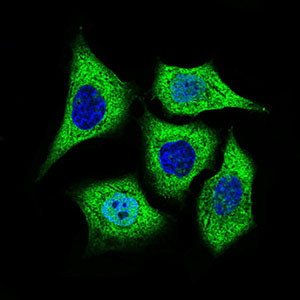
Immunofluorescence analysis of HepG2 cells using ALDH2 mouse mAb (green). Blue
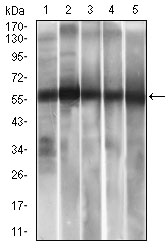
Western blot analysis using ALDH2 mouse mAb against HepG2 (1), A549 (2) cell lysateuff0c and Rat liver (3), Mouse liver (4), Mouse brain (5) tissue lysate.
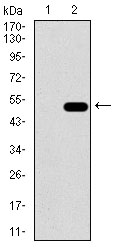
Western blot analysis using ALDH2 mAb against HEK293 (1) and ALDH2 (AA
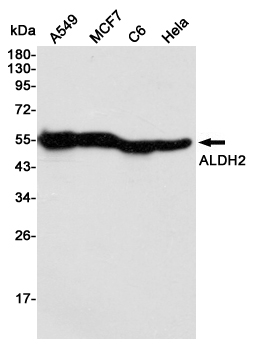
Western blot detection of ALDH2 in A549,MCF7,C6 and Hela cell lysates using ALDH2 mouse mAb (1:3000 diluted).Predicted band size:56KDa.Observed band size:56KDa.
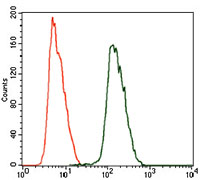
Flow cytometric analysis of HeLa cells using ALDH2 mouse mAb (green) and negative control (purple).
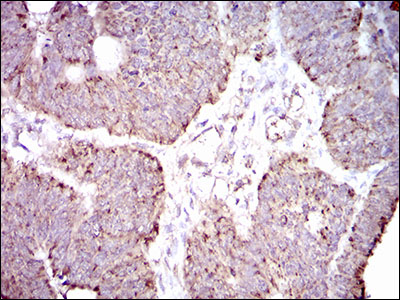
Immunohistochemical analysis of paraffin-embedded rectum cancer tissues using ALDH2 mouse mAb with DAB staining.
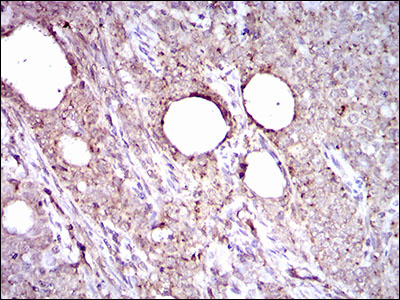
Immunohistochemical analysis of paraffin-embedded cervical cancer tissues using ALDH2 mouse mAb with DAB staining.
-
Background
Swiss-Prot Acc.P05091.This protein belongs to the aldehyde dehydrogenase family of proteins. Aldehyde dehydrogenase is the second enzyme of the major oxidative pathway of alcohol metabolism. Two major liver isoforms of aldehyde dehydrogenase, cytosolic and mitochondrial, can be distinguished by their electrophoretic mobilities, kinetic properties, and subcellular localizations. Most Caucasians have two major isozymes, while approximately 50% of Orientals have the cytosolic isozyme but not the mitochondrial isozyme. A remarkably higher frequency of acute alcohol intoxication among Orientals than among Caucasians could be related to the absence of a catalytically active form of the mitochondrial isozyme. The increased exposure to acetaldehyde in individuals with the catalytically inactive form may also confer greater susceptibility to many types of cancer. This gene encodes a mitochondrial isoform, which has a low Km for acetaldehydes, and is localized in mitochondrial matrix. Alternative splicing results in multiple transcript variants encoding distinct isoforms.
Related Products / Services
Please note: All products are "FOR RESEARCH USE ONLY AND ARE NOT INTENDED FOR DIAGNOSTIC OR THERAPEUTIC USE"
